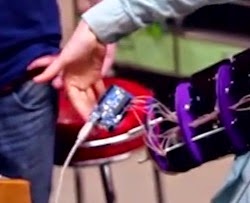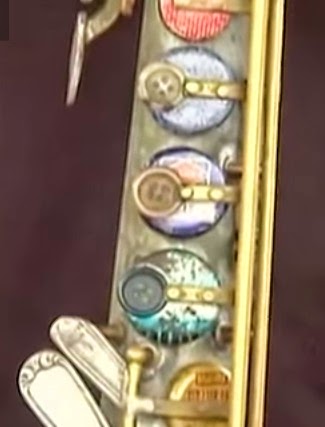So yesterdays post was about littleBits and the new cloudBits that seems to make it pretty easy for littleBits to play with the Internet of Things. Writing that post made me curious about the combination of Arduino and littleBits.
A TechCrunch article from May 2014 covered the Arduino-At-Heart module for littleBits and the Arduino Starter Bundle. TechCrunch explains the collaboration between these two tech ecosystems this way:
This Instructables shows what was previously involved with adding Arduino capabilities to the littleBits synth kit before the Arduino-littleBits modules became available.
To learn more about the littleBits Arduino module, check out the webpage for that module. If you want to know more about the littleBits Arduino starter kit, heres a link to that webpage.
At the next meeting of the Humboldt Microcontrollers Group, Ill ask how many people there have worked with littleBits. If no one has, it would be an interesting exercise to get a few littleBits modules and see what all the options are for combining them with traditional microcontroller projects. If you have littleBits modules and are coming to the August 7 MCU meeting, please bring them to the meeting. Thanks!
Read More..
 |
| Arduino-At-Heart module for littleBits |
A TechCrunch article from May 2014 covered the Arduino-At-Heart module for littleBits and the Arduino Starter Bundle. TechCrunch explains the collaboration between these two tech ecosystems this way:
"The world of littleBits...can now play friendly with Arduino. If you’re not familiar with littleBits, it might help to think of it as a DIY Electronics kit mashed up with LEGO. Each “bit” is an individual electronic component, like a speaker, or a light sensor, or a blinky LED. Snap them together, and you can do all sorts of cool stuff — no programming required...That “no programming required” point has always been one of littleBits’ biggest strengths; it meant that anyone could start putting stuff together, pretty much by accident. Alas, up until now, “no programming required” also meant “no programming allowed”...The littleBits idea is great — but once a particularly enthusiastic user hit the limits of what their kit could do, the next step (learning toThe Engadget May 2014 coverage of the littleBits Arduino module rollout talks about some of the advantages of this module:use a standalone Arduino board, which meant also learning proper circuitry, soldering, etc.) was suddenly a pretty big one...This morning, littleBits is introducing an Arduino module into the mix. It’ll snap right into place — no soldering required — just like the other littleBits modules, with one big difference: it’s programmable. You get the programmability of an Arduino, without having to learn the myriad other prerequisite skills. You jack into it via the onboard microUSB port, upload your programming via the standard Arduino IDE, and all of your littleBits modules fall in line."
"...it also opens the door to interaction with your computer. Since the Arduino module has USB support built-in, you can create Etch-A-Sketches, Pong games and other programs that have LittleBits and your PC working in harmony. Rothman adds that many existing Arduino projects should work with only a few slight tweaks to pin assignments."
 |
| Arduino Starter Bundle for littleBits |
To learn more about the littleBits Arduino module, check out the webpage for that module. If you want to know more about the littleBits Arduino starter kit, heres a link to that webpage.
At the next meeting of the Humboldt Microcontrollers Group, Ill ask how many people there have worked with littleBits. If no one has, it would be an interesting exercise to get a few littleBits modules and see what all the options are for combining them with traditional microcontroller projects. If you have littleBits modules and are coming to the August 7 MCU meeting, please bring them to the meeting. Thanks!
**********











